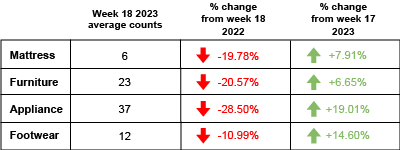Customers now expect a personalized shopping experience instead of just wanting it.
Because consumers are now more aware of how their personal information is being collected and shared, and there are tighter regulations on the collection of third-party data, it has become crucial for businesses to gather their own first-party data.
In this week’s discussion, we will explore the issue of data collection and its impact on the shopping experience.
THIS WEEK’S HIGHLIGHTS
- The social shopper: social commerce is no longer just a trend, it’s a way of life
Datapocalypse: The deep dark world of data collection.
Q1 2023 Benchmark Report: Click HERE to see how your store compares to the industry average.
FOOT TRAFFIC INDEX

FOOT TRAFFIC TRENDS
Industry insights so you can convert your foot traffic into more sales.
The social shopper
While physical stores will continue to be the bread and butter for consumers, shopping on social media is becoming an increasingly popular way for people to buy new goods.
Gone are the days when social shopping was just a gimmick. In fact, a recent report by Accenture predicts that social commerce will reach a whopping $1.2 trillion by 2025, up from $492 billion in 2021. That’s not just chump change!
It’s official, social commerce is no longer just a trend, it’s a way of life. People have embraced it as a legitimate way to shop and it’s only going to get bigger.
And let’s not forget about the power of influencers. They’re a crucial part of the social commerce scene, convincing their followers to jump on the bandwagon and make a purchase. In fact, 59% of respondents said they were influenced by an influencer post to buy something on social media in 2021.
So, if you’re not on board with social commerce yet, now’s the time to get with the program. Give your customers another avenue to shop and watch your sales soar!
Datapocalypse
Customers no longer want a personalized shopping experience, they expect it.
Gone are the days when 3rd-party data was the go-to route for collecting info to tailor the shopping experience. With companies like Apple exposing the truth about mass data collection from 3rd parties, consumers are much more aware of what info they give away. And with stricter regulations, collecting data has become a real pain in the neck.
A recent survey found that a whopping 69% of consumers are worried about how their personal data is collected within mobile applications. Despite all the cookie and 3rd-party data controversies, 81% of companies still rely on third-party data.
Although collecting first-party data can seem daunting at first, but it’s worth the effort in the long run. First-party data is all the juicy details you collect from within your own customer ecosystem – think email convos, social media followers, app usage, website traffic, and more.
Soon enough, first-party data will be essential for personalizing shopping experiences without relying on buying data elsewhere.
Click HERE to learn more about the growing need to collect first-party data.
Retail Snippets.
BBB Bust: Why Bed Bath & Beyond’s private labels were a bust.
Generative AI: 3 ways Generative AI is transforming the retail industry
Efficient tech: How technology is making the retail industry more efficient .
Random Irrelevance
DuckAssist: How wine and candy helped an Australian woman survive 5 days in the bushland.
Solved: Astronomers claim to have solved the mystery of the runaway supermassive black hole.
The final push: EU could approve Microsoft’s Activision Blizzard acquisition next week.
